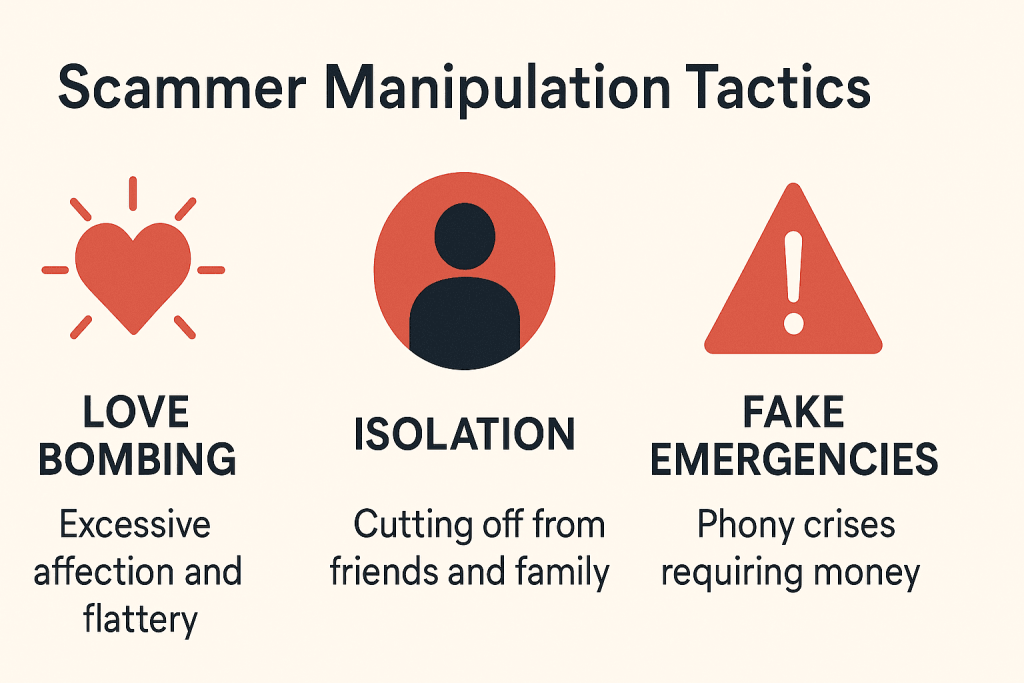Online dating has transformed how people connect, bringing love to our screens and messages to our fingertips. Yet, in the shadows of these digital interactions, a darker side thrives the world of romance scams. These scams are not random acts of deceit; they’re carefully crafted manipulations that exploit emotions, trust, and hope.
To truly understand how victims fall prey, we must uncover the psychology of romance scams, the tactics of scammer manipulation, and the devastating emotional fallout of emotional fraud.
The Psychology of Romance Scams: A Study in Human Vulnerability
At their core, romance scams exploit universal human needs love, companionship, and validation. The psychology of romance scams lies in the understanding that everyone, regardless of age, intelligence, or experience, can be emotionally influenced under the right circumstances.
Scammers study human behavior. They know that emotional bonds form through consistent communication, empathy, and vulnerability. By mirroring their victims’ interests, values, and emotions, they create the illusion of a genuine connection.
This process triggers a psychological phenomenon called “emotional transference”, where victims project feelings of love and trust onto the scammer, even when the relationship exists only in digital form. Once emotional trust is established, logic often takes a backseat.
Scammer Manipulation: The Art of Emotional Control
Scammer manipulation is a masterclass in psychological persuasion. These con artists use emotional intelligence, patience, and calculated storytelling to build credibility.
They start by creating the perfect persona often attractive, successful, and emotionally available. Then, through weeks or months of careful communication, they establish themselves as a reliable confidant. Once that bond deepens, they begin subtly shifting the emotional balance, creating dependency and attachment.
Key manipulation techniques include:
- Love Bombing – Scammers overwhelm victims with affection, attention, and compliments to accelerate emotional bonding.
- Mirroring – They reflect back the victim’s opinions, dreams, and values to create a false sense of compatibility.
- Isolation – By encouraging secrecy (“Let’s keep this between us”), they cut victims off from family or friends who might notice red flags.
- Crisis Creation – Scammers fabricate emergencies to evoke empathy and financial help.
Through this emotional choreography, victims are conditioned to trust and even defend their manipulators.
Emotional Fraud: When Love Becomes a Weapon
The most painful part of these scams is emotional fraud the deliberate use of affection and vulnerability to deceive. Victims are not only financially defrauded but also emotionally betrayed.
Unlike traditional financial scams, emotional fraud leaves deep psychological wounds. Victims often describe feelings of heartbreak, shame, and disbelief. Many question their own judgment, struggling to reconcile how someone they loved could be fictional.
The impact can be long-lasting:
- Trust issues that affect future relationships
- Depression or anxiety from emotional trauma
- Financial ruin after sending money or gifts
- Social withdrawal due to embarrassment
Emotional fraud weaponizes empathy the very trait that defines our humanity.

The Psychology of Romance Scams: Building False Intimacy
To fully grasp the psychology of romance scams, we must understand how false intimacy is built. Digital communication offers a safe space for people to express their deepest thoughts without judgment. Scammers exploit this intimacy, using emotional cues to appear authentic.
They often:
- Respond instantly to messages to show attentiveness
- Remember personal details to appear caring
- Send good morning/night messages to simulate a relationship routine
Over time, these behaviors condition the brain to release dopamine, the “feel-good” hormone. Victims associate the scammer with positive emotion, reinforcing attachment.
This neurological reinforcement loop makes it incredibly difficult for victims to accept the truth, even when evidence of deception emerges.
Scammer Manipulation Through Empathy and Storytelling
Empathy is the scammer’s greatest tool. Through storytelling, they fabricate believable life circumstances a soldier stationed overseas, a doctor on humanitarian duty, or a widow raising a child. These stories invoke sympathy and admiration, lowering the victim’s guard.
Scammer manipulation thrives on this empathy. Once a strong emotional connection forms, the scammer introduces hardship: a medical emergency, lost passport, or sudden debt. The victim’s emotional impulse to help overrides skepticism.
Every message, call, or photo is part of a carefully orchestrated psychological campaign. The scammer’s ultimate goal isn’t just money it’s control. Once a victim sends help once, they’re statistically more likely to do so again.
Emotional Fraud and Cognitive Dissonance: Why Victims Stay
When reality begins to clash with illusion, victims often experience cognitive dissonance the discomfort caused by holding conflicting beliefs.
For instance, part of the victim recognizes inconsistencies (“Why can’t we video chat?”), but the emotional side refuses to believe the person they love is fake. Scammers exploit this by providing just enough reassurance to restore faith.
This is why emotional fraud is so powerful victims often defend their scammers against suspicion, believing they’re misunderstood rather than manipulative.
Psychologists liken this behavior to trauma bonding a cycle of affection, deceit, and reconciliation that traps victims emotionally.
The Financial Side of Emotional Fraud
While the emotional damage is profound, the financial consequences are equally devastating. Global reports estimate billions lost annually to romance scams.
Scammers use payment requests that appear innocent at first a loan, a gift card, or a small favor. Over time, these requests grow in size and urgency.
Common tactics include:
- Claiming to need money for travel to meet the victim
- Fake investments or cryptocurrency opportunities
- Sudden medical or family emergencies
By the time victims realize the truth, the scammer has often vanished deleting accounts and erasing all traces. The heartbreak that follows is compounded by guilt and financial loss.
The Emotional Aftermath: Healing from Emotional Fraud
Recovering from emotional fraud takes time. Victims often struggle with anger, shame, and grief grieving not only the lost money but the illusion of love itself.
Therapists recommend treating these experiences as emotional trauma, not mere gullibility. Healing involves:
- Acknowledging the deception without self-blame
- Seeking support from trusted friends or professionals
- Reporting the scam to authorities
- Rebuilding confidence in one’s judgment
Support groups for scam victims can also help individuals share experiences and regain emotional stability.

Preventing Scammer Manipulation in Digital Relationship
Prevention starts with awareness. Here’s how to safeguard yourself against scammer manipulation and emotional fraud:
- Verify identity – Use video calls early in the relationship.
- Watch for love bombing – Intense affection too quickly is a red flag.
- Avoid financial involvement – Never send money or share banking info.
- Question inconsistencies – If their story changes often, it’s manipulation.
- Trust your intuition – If something feels off, it probably is.
The more people understand the psychology of romance scams, the harder it becomes for scammers to exploit others.
The Future of Online Dating: Building Trust Through Verification
As online dating continues to grow, platforms are adopting new tools to protect users from emotional fraud and scammer manipulation. Verification, transparency, and AI-driven safety checks are key to restoring trust in digital connections.
Real love deserves real people and platforms that prioritize authenticity are leading the way toward safer digital romance.
Awareness Is the Best Defense
Understanding the psychology of romance scams is the first step toward prevention. These scams succeed not because people are naïve, but because they exploit the most human emotions love, empathy, and trust.
Stay vigilant, stay informed, and choose platforms that put honesty first.
Trusted and True is the first dating platform truly dedicated to eliminating fake profiles, bot scams, and catfishing.










